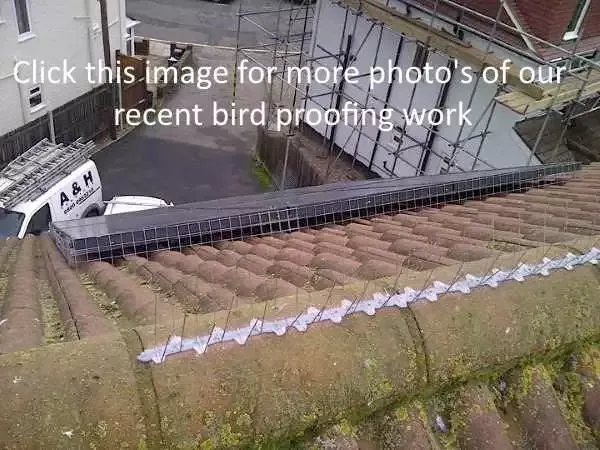Address
A & H Pest Control
The Berries
Yester Rd
BR7 5LT
020 8295 3402
Address
A & H Pest Control
The Berries
Yester Rd
BR7 5LT
020 8295 3402

Solar panels have grown into a familiar feature on British houses and commercial buildings over time. Driven by the push for clean energy and state subsidies, solar panels offer an environmentally sound and affordable solution. However, an emerging headache for property owners is pigeons making homes beneath solar panels.
While solar panels help generate green energy, they have also unintentionally created the perfect environment for pigeons, leading to a series of complications. The warmth and shelter beneath solar panels attract pigeons, leading to various problems for solar panel owners. The issue has raised concerns, from damage to the solar panels to the health risks posed by pigeons.
The top reason pigeons gravitate to solar panels is the shelter and warmth underneath. Positioned aloft on roofs, solar panels give pigeons a quiet, safe haven. During cold spells, the heat off solar panels makes them even more attractive. Similar to other birds, pigeons seek cosy, covered spots to rest in winter. The panels deliver a comfy, predator-free zone plus weather protection from rain or wind.
Beyond cosy shelter, the area beneath panels is ideal for pigeon nests. Urban-based pigeons have few organic nesting choices. The tucked-away, secure panel undersides are ideal, boosting nesting trends. Consequently, such spaces tend to fill with twig nests, feathers, and bird litter.
The Effects of Pigeons on Solar Panels One of the most significant issues caused by pigeons nesting under solar panels is the damage they can inflict on the panels themselves. The acidic nature of pigeon droppings can cause corrosion to the solar panels, resulting in long-term damage. Pigeon droppings that accumulate under the panels can lead to corrosion of the metal and wiring, diminishing efficiency. The build-up of waste beneath the panels increases the likelihood of long-term damage.
One of the most concerning aspects of having pigeons under solar panels is the damage caused by their droppings. Over time, pigeon droppings can corrode the surface of solar panels, causing them to lose efficiency and incur repair costs. As the waste accumulates, it can block the panels, preventing them from absorbing sunlight and reducing their energy output.
Pigeons beneath solar panels also pose significant health risks. Pigeons can carry diseases such as Salmonella and E. coli, which can be transmitted through their droppings. The droppings can become a breeding ground for dangerous bacteria, jeopardizing public health.
Primary alarm is pathogens moving through pigeon waste. Dried droppings turn pathogens airborne, risking breathing troubles when inhaled. Grabbing droppings or sucking in dust might ail humans. Threats jump for the old, fragile, or asthma sufferers.
Droppings bring mites and fleas, boosting health dangers. These insects could swap diseases or bug people, mainly inside. So, pigeons plus droppings hit property and occupant health.
Stopping pigeons beneath panels takes effort, but tools are available. Best bets are barring entry or shooing pigeons away early.
Adding Netting or Mesh: One great way is edging panels with netting or mesh to stop birds. That shuts off below-panel gaps, ending nesting. Weather-tough and strong, the mesh stays a lasting solution.
Bird Spikes: Bird spikes at panel sides or settle spots are effective. They make perching tough, nudging pigeons elsewhere. Yet spikes may not kill nesting if it’s set up.
Regularly cleaning and maintaining solar panels can significantly reduce the likelihood of pigeons nesting underneath them. Regularly cleaning the area beneath solar panels can help prevent pigeons from returning. In some cases, professional pigeon control services may be necessary to ensure the problem is addressed effectively.
Specialist Pigeon Control: Stubborn roosts mean time for expert help. Specialists eye spots and apply cures like blocks or clears. They ensure pigeons stay gone for good.
Reputed solar entities in the United Kingdom use highly effective methods to improve the productivity of these panels. This prevents unwanted damages to the panels. A mesh system is used over the solar panels to protect them from birds and bird droppings. All birds, insects and bird droppings are kept away through these meshing systems. Most of these mesh systems are virtually invisible from ground level. The roof is not screwed or drilled to install the mesh system. A special kind of clip is used to secure the mesh system which will not damage the solar panels. The mesh system will not interfere with the warranty of the solar panels. In fact, the warranty of the panels will not be affected in any way by the mesh system installed. This is why it is important that you consider bird proofing your solar panels to improve their efficiency and productivity in the long run.